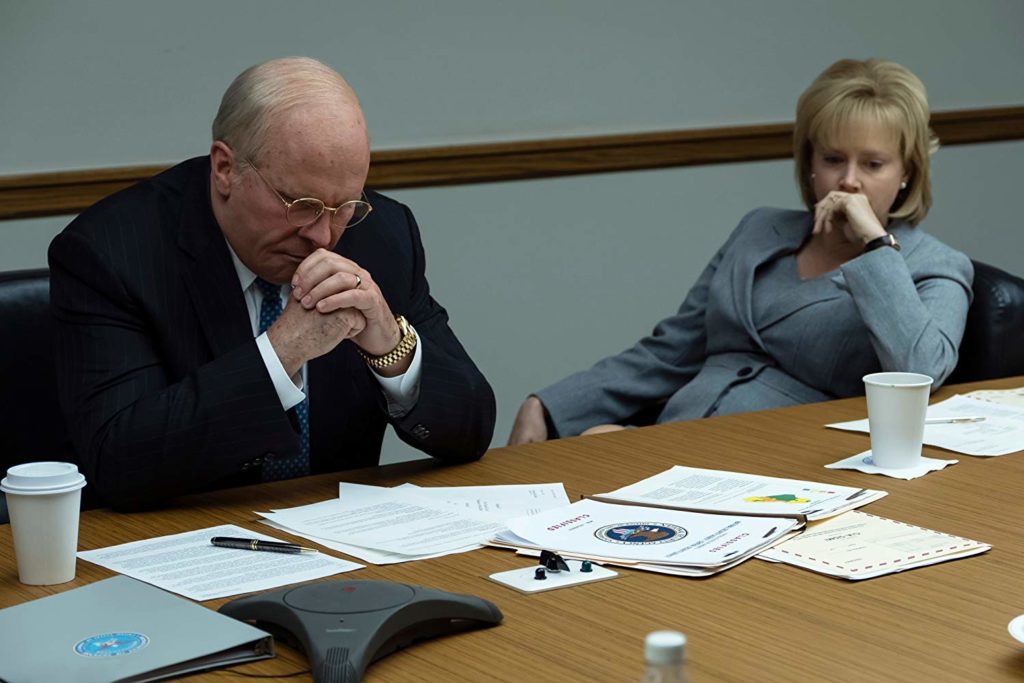Vice, Adam McKay’s newest addition to his bizarre roster of works, is incredibly designed, written, performed, and edited and therefore deserves the attention and praise it demands; however, this movie isn’t made for everyone. Vice tells the story of Dick Cheney, the Machiavelli of modern politics (played masterfully by a nearly unrecognizable Christian Bale), and his suspicious and malicious rise through the political bedlam of early 2000’s America to his eventual transition into his widely controversial vice presidency. This is not a patriotic film nor an objective one, though in fairness, it never technically claims to be. Nevertheless, it offers an expertly crafted criticism of the political arena in a time overflowing with divisive media targeting each other without remorse.
Formally speaking, this is a Best-Picture worthy movie. Every performance deserves an award. Christian Bale, Amy Adams, Steve Carell, and Sam Rockwell should all be tried for theft for the sheer number of scenes each of them steal in their own distinctive ways. McKay and his creative team have completely outdone themselves (though their past works of mostly comedic ventures led by Will Ferrell don’t offer ample competition). There are symbolic shots and metaphorical meetings scattered through the runtime of the film, both offering some levity in otherwise very grim situations and meaning in otherwise very mundane sections. Though while the delivery of McKay’s argument is nearly flawless, the argument itself offers something to be desired.

Where the film falters is in its sharp bias against its cast of characters stripped right from reality and ripped apart from start to finish, which not only alienates audiences from almost every character on screen but also alienates itself from an objective point of view, an essential key for any movie that has an seemingly omniscient narrator, which Vice does. McKay and his team obviously spent an enormous time researching the events of this film and then even had the wit to admit that even they could not unravel all of Cheney’s dark and closely held secrets, but then they presented their findings under the same subjectivity as the majority of today’s Twitter posts. Aside from about five total minutes of sympathetic characterization, Vice tells the story of a group of comically evil politicians who literally laugh hysterically at the question, “What do we believe in?” and therefore fails to offer much more than a two hour long rant. For those who already agree with the film’s politics, Vice doesn’t add much besides maybe some extra paranoia against politics. For those who disagree, Vice does nothing to change their minds.
Adam McKay’s Vice resembles a dark comedy that fired four out of five of its comedy writers and settled with a dark and depressing drama about poisonous politicians. It is formally a masterpiece, but it could be so much more. We live in an age in which the name “The United States” is more ironic than anything else, and though entertainment used to be a unifying experience, it has recently been reutilized by many as a weapon. This film, if nothing else, is an effective weapon in a war of words. If that’s all your looking for, then this movie is for you. If you were looking for hope, rewatch the latest Disney movie instead. Overall, Viceacts like any good politician and bad leader. It says a lot but has little to say. It speaks for its supporters and dehumanizes its opponents. It has a well-groomed image and well-written speech, but in the end, it feels too manipulative to take it seriously.
Published February 11, 2019 in University of Iowa Bijou Film Board
